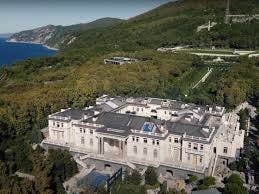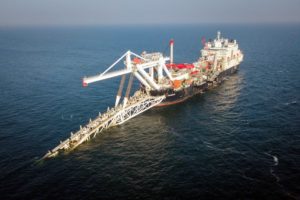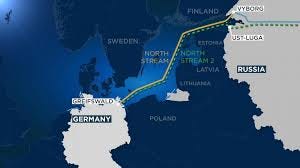by Nikola Mikovic
Russian President Vladimir Putin is expected to face some serious challenges in 2021. The West has already started pressuring Kremlin to release Alexey Navalny — the anti-corruption opposition figure who was arrested on January 17th upon his return from Germany, where he spent five months recovering from being poisoned by an alleged Russian nerve agent, Novichok. Reported the Wall Street Journal on February 7, his arrest “galvanized the biggest popular protests in Russia in nearly a decade, as his supporters were joined across the country by average Russians upset with falling living standards and shrinking political freedoms.”
But now, the Journal adds, “Mr. Navalny’s allies have scrapped further protests following the detention of more than 6,000 in the recent demonstrations as well as police violence against the protesters—factors that could make it more difficult to keep mobilizing followers. Instead, his movement will focus on parliamentary elections this September, when his backers hope to unseat the ruling United Russia party loyal to President Vladimir Putin.”
One of the protesters reportedly told the BBC on January 31.”I am tired of the despotism and lawlessness of the authorities. No questions have been answered. I want clarity, openness, and change.”

On January 22nd, shortly after Navalny’s arrest, his support team released a video, which would soon be seen by 38 million viewers, showing a multi-billion dollar palace on the Black Sea which Navalny alleges is owned by Putin and was built with fraudulently obtained funds.
In response, the Kremlin denied that Putin owned the palace, insisting that the palace “has nothing to do with Putin or the Kremlin.” But the video further enflamed the protests, as tens of thousands marched in cities across Russia, causing the Kremlin to accuse the US embassy of encouraging the protests and disclosing the location of the Moscow demonstrations on its website while urging American citizens to stay away from it.
Pipeline Politics: The Nordsteam 2 affair
The arrest of Alexey Navalny will undoubtedly have a serious impact on relations between Moscow and the West. The repercussions are already being felt. According to reports, the day after the opposition politician was arrested, New York City authorities disconnected all city telephone lines of the Russian Consulate General in New York. In addition, the United States slapped sanctions on the Russian ship Fortuna, which is involved in laying the pipe for the Nord Stream 2 natural gas pipeline that would bring Russian energy to Germany under the Baltic Sea.

Washington has said on numerous occasions that the Nord Stream 2 would make Europe more dependent on Russian gas.
It is believed, however, that the US is trying to promote sales of its own liquefied natural gas to European countries. Indeed, after the new imposition of sanctions, Russian energy giant Gazprom said that there is a risk that the project could be suspended or canceled now that only six percent of the pipeline, or about 150km (93 miles), remains to be completed.
The Fortuna has started its work in Danish waters, however, “including preparatory work and tests before pipelay work starts,” according to the Danish Maritime Authority. But this does not necessarily mean that the project will be completed any time soon. According to Russian energy expert Mikhail Krutikhin, the Nord Stream 2 is dead and “its pipes will lie at the bottom of the sea, and no one will use them.”It is worth remembering that the US already imposed sanctions against companies involved in this project, which is why the Swiss-Dutch enterprise Allseas suspended its pipe-laying activities in 2019. This is why some Russian analysts argue that new American sanctions are a “continuation of the Donald Trump policy.”

Even though the new US President Joe Biden recently spoke with Russian leader Vladimir Putin, it is likely that the American policy towards Russia will be firmer than that of his predecessor, who Biden once derided as “Putin’s puppy.” Even if Russian authorities eventually release Navalny — who was jailed over alleged violations of his 2014 suspended prison sentence for embezzlement– a large portion of sanctions against Moscow (imposed after the Kremlin incorporated Crimea into the Russian Federation) will likely remain intact. At this point, however, Navalny’s release does not seem probable. According to the former world chess champion and Russian dissident Garry Kasparov, Putin will not make a single concession—unless something really serious happens to force him to.
“I think that President Joe Biden might be looking at Russia and Putin’s aggressive hybrid war against the Free World as a historic opportunity,” Kasparov said. “A strong response to Putin’s aggression, and maybe even the end of Putin’s dictatorship, could earn him the same place in history as the great American presidents” Kasparov added.
Other prominent Russians see the Navalny affair differently. Oleg Matveychev, a member of the Russian Expert Institute for Social Research, points out that Alexey Navalny became one of 15 applicants out of 1000 to be accepted into a highly coveted leadership program at the US Ivy League university Yale in 2010 — on the strong recommendation of dissident Garry Kasparov
“It has long been clear to everyone that Alexey Navalny is just a tool for the West, a bargaining chip against Russia”, said Matveychev, who is often described as “a spin doctor for the Kremlin.”
But he is not alone. There are other Russian authors who believe that the opposition politician has turned into an agent for Western countries, and that he now has no opportunity to refuse such a role. According to the independent Levada Center poll, more than half of Russians do not believe that Alexey Navalny was poisoned – at least not by the Russians, and more likely by Western intelligence agents. Many Russians question how Vladimir Putin would benefit from killing a politician whose approval ratings were very low, contrary to Western reportage that has consistently shown him as an immensely popular dissident.
There are also fears in Russia that the anti-corruption campaigner could play the same role as the widely revered Soviet leader Vladimir Lenin played more than 100 years ago. Navalny’s trip home has already been compared to Lenin’s famous return from Switzerland to Russia in 1917, where he forced the October Revolution. Recently, Putin’s spokesman Dmitry Peskov openly accused Navalny of working with the CIA, although Russian authorities have offered no proof that the anti-corruption campaigner is a “foreign agent.” Instead, he was sentenced by a Moscow court to three and a half years in a penal colony for breaking probation rules while in Germany. The Kremlin has already said that it will not take notice of calls from a number of Western leaders for the release of the 44-year old opposition figure. Russian policy makers are quite aware that Navalny’s release would mean Moscow had succumbed to Western pressure.
It is worth noting that this “first round” of protests following Navalny’s arrest was relatively calm, even though some 6000 people were detained. Russian riot police reportedly behaved more restrained than usual, possibly in order not to repeat the same mistakes that the Belarusian Alexander Lukashenko made after he was first faced with mass protests in August 2020. Russian authorities are well aware that a brutal crackdown on demonstrations could lead to a series of Maidan-style protests in the capital of neighboring Ukraine that resulted in regime change. At this point, however, such a scenario does not seem probable in Russia, although there are indications that some Russian oligarchs could eventually turn against Putin. For instance, the son of billionaire Mikhail Fridman, one of the richest and most influential tycoons in Russia, participated in the protests in Moscow. Thus, it is not a coincidence that Kasparov recently called the United Kingdom to impose sanctions on oligarchs close to Putin.
For the time being, the Russian leader does not have to fear for his position. In the mid-term, though, if Western pressure and sanctions against the Russian Federation continue to grow, it is not improbable for certain oligarchic groups to push for a “palace coup” in the Kremlin. Indeed, there are interesting times ahead for Russia.
Nikola Mikovic is a contributor to CGTN, Global Comment, Byline Times, Informed Comment, and World Geostrategic Insights. He is a goepolitical analyst for KJ Reports, and Global Wonks
